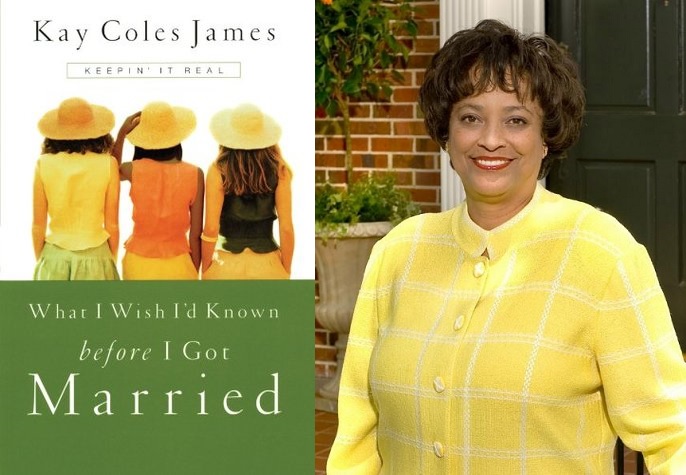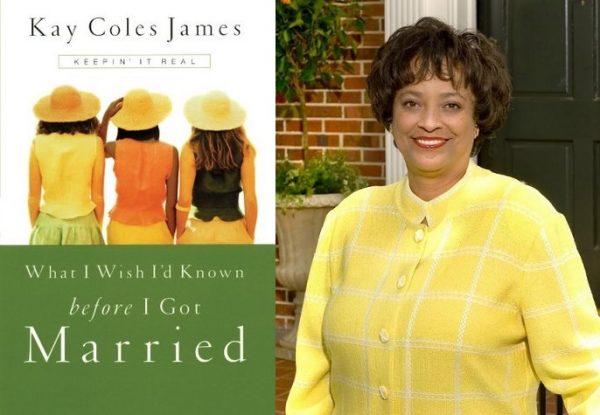[Keepin’ It Real]
By Kay Coles James (with John Littel)
Multnomah Publishers Inc, 2001
ISBN 978-35714-7-8
I’ve always said that if I had to choose only two books apart from the Bible to prepare me for marriage, this would definitely be one of them (the other is What No One Tells The Bride by Marg Stark). From wedding planning and amazing married sex, to money secrets and work-life balance, Kay Coles James addresses issues about which most books are usually silent in the frank, straight-up, humorous way characteristic of Black American women.
I especially agree with her when she asks, “The fact is that there are some things your mother cannot bring herself to discuss with you. Your sister, if you are fortunate enough to have one, is often just as confused as you are. So who is supposed to tell you the ‘real deal’, the unadulterated truth?” Acknowledging this problem, she takes on the role of a “sister-girlfriend”, telling it like it is, at the same time telling it in love.
To truly appreciate this book, however, the reader must take into consideration the author’s conservative leanings. According to her, “This book is written for a very narrow audience. Though much of what I’ve written may apply to you, I did come at this from a Judeo-Christian perspective. There are certain presuppositions about love, commitment, children and faith that, depending on your faith tradition, you might not understand, agree with or find very helpful.”
That said, Mrs James does an excellent job, mainly due to the wealth of experience from which she draws. Herself a wife, mother and public servant for over 20 years, recently appointed by President Bush to serve in his administration as at the time of her writing the book, she unashamedly shares her experiences offering practical and unique insights as she does so.
In Chapter One, she shares the emotions that accompanied the announcement of her daughter’s engagement and the subsequent preparations that had to be made, commenting on the shock of finding out first-hand how much weddings really cost! She also writes about the need for both pre-engagement and premarital counselling, spending time with and getting familiar with each other’s families, parental consent, as well as spiritual preparation.
In Chapter Two she makes a case for the family, emphasizing the importance of marriage in a world that no longer considers it necessary. She points out that statistics show married people live longer, have significantly higher incomes, savings and retirement options, are healthier and suffer less from depression, alcoholism and substance abuse, and surprisingly, that married women are more satisfied sexually than unmarried women and that this statistic is even higher among Christians. She writes about the need for prayer, abstinence, counselling before marriage and very importantly about thinking through what it means to be married, and specifically, what it means to be married to this person.
In Chapter Three she discusses “forever”, and just what it means- FOREVER, as well as the sacredness of wedding vows, advising intending couples to get used to the fact that some things about their partners are never going to change.
In Chapter Four she writes about the decision to have or not to have kids, the fact that they are not the focus of marriage, and goes on in Chapter Five to offer wonderful insight into what she calls “an old issue with a fresh face”- the issue of work/life balance. She explains why we must work, the fulfilment issue, the money issue and the permanence issue and she distinguishes between “work” and “career”. This was about the most important chapter to me and I consider it a must read.
In Chapter Six she describes what she calls “preventative care”, which involves taking care of your marriage while it is still in good shape, instead of waiting till things start to go downhill, and she suggests some tips. After this comes extensive writing about communication in Chapter Seven, stating among other things that sometimes you have to make conscious effort to put your spouse first before friends and family, advising that “If you have girlfriends with whom you share everything, remember to set some boundaries. Make certain that you are not talking to them about things that you should be sharing with your husband”. Hmmm.
She tackles financial issues head-on in Chapter Eight and offers advice so valuable I couldn’t possibly afford it if I had to pay a consultant for it. She also courageously tackled issues such as borrowing and lending money to friends and family, setting priorities, tithing, debt reduction, insurance, saving and investment. Furthermore, she advises women to keep a ‘just in case” stash somewhere, and to be prepared for an unpredictable economy.
It gets personal in Chapter Nine, where she honestly handles intimacy and sex issues, discussing the elements of great sex, and showing readers the path back to intimacy. She also refers to Dr. John Gray’s book, “Men Are from Mars, Women Are from Venus” when she writes about the various kinds of sex; fast food, home cooking, gourmet meals. She got me thinking, especially when I read brides answers about what they wished they had known about sex in marriage, and in Chapters Ten and Eleven she deals with abuse in marriage and crisis points. She also writes about dealing with pornography, verbal and physical abuse, and rebellion in children. About surviving crisis points she says; Have a safe harbour, eliminate stress, take all the help you can get, take time to feel, express your emotions, take good care of your health, put the crisis in perspective, ask God to help you and take a break.
A great read —get it!


